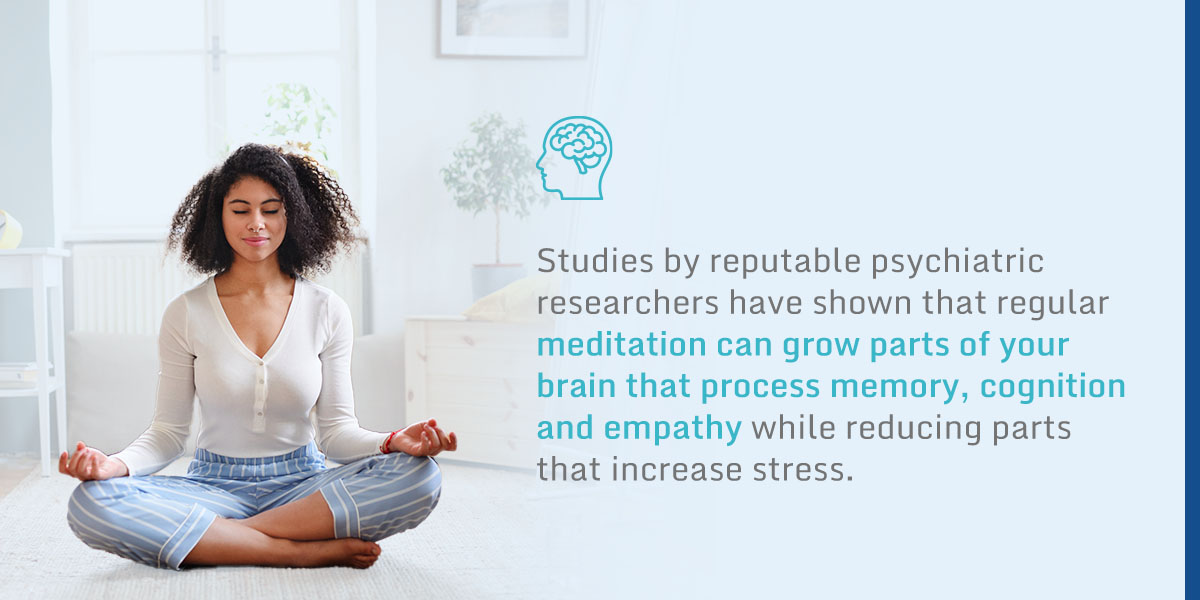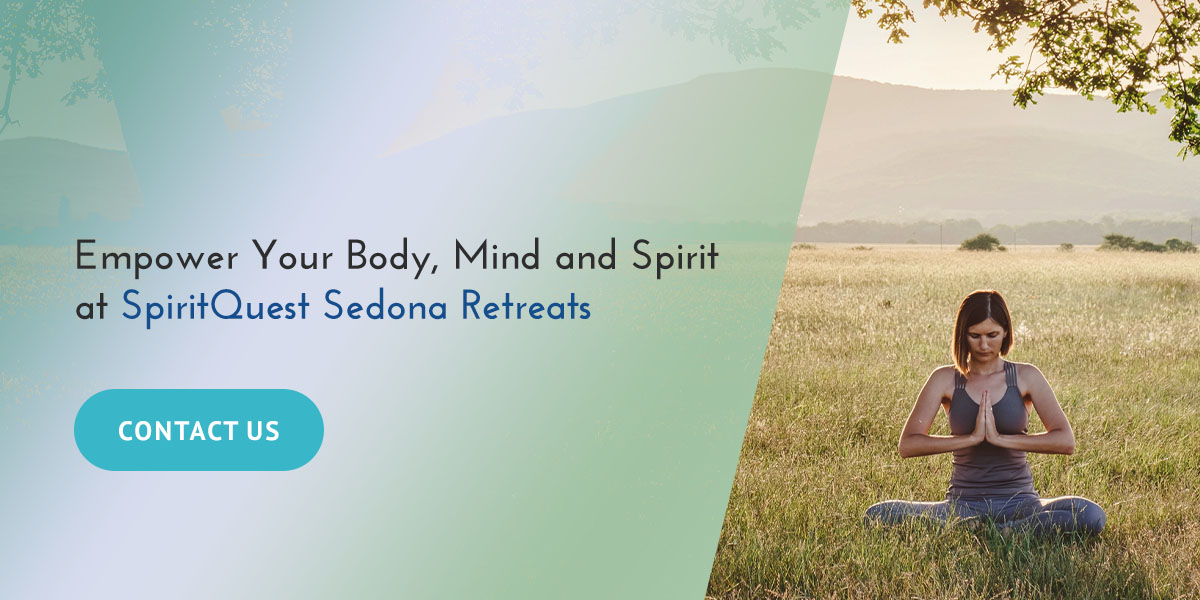Meditation is an ancient mindfulness practice with rigorous scientific backing in the modern age. It can help you find peace amidst a chaotic world, enhance your awareness, quiet distracting thoughts and build mental resilience in a truly unique way.
Despite the many benefits of meditation, myths, assumptions and misunderstandings still cloud many people’s view of this life-changing growth technique. This guide addresses common misconceptions about meditation and explains how mindfulness actually works.
The Top 5 Misconceptions About Meditation Debunked
Meditation is often stereotyped in movies, television, literature and other media as an exclusively spiritual, scientifically unfounded, inaccessible practice. The truth about meditation is far more intriguing and valuable, so it’s crucial that meditation experts unpack and debunk myths and misconceptions like these. That way, humanity can experience the empowering benefits of meditation, unclouded by misinformation.
Misconception 1 — Meditation Is a Religious Practice
Although meditation has been a sacred part of many spiritual and religious traditions for thousands of years, it doesn’t “belong” to any specific belief system. Studies have shown that meditation has astoundingly positive mental and physical effects beyond pursuing spiritual enlightenment. Many types of meditation exist, and there’s a type best suited to every philosophy, from empirically-minded to humanistic. Types of meditation that can help anyone include:
- Mindfulness meditation: In this form of meditation, you learn to observe your thoughts without judgment and let them pass, becoming fully present in the moment.
- Focused meditation: In focused meditation, you place your awareness on a specific focal point, such as the rhythm of your breathing, a sound, an idea or a goal.
- Mantra meditation: Also known as transcendental meditation, mantra meditation involves repeating a phrase, prayer or affirmation to keep your mind centered.
- Guided meditation: A mediator verbally guides you through your meditation, usually giving you instructions on visualizing, breathing or exploring a space in your mind.
- Metta meditation: Metta, or “loving-kindness” meditation, is a technique derived from Buddhist philosophy that encourages compassion and self-love through positive affirmations.
- Movement-based meditation: Movement-based meditations, like tai chi or qigong, include slow, deliberate movements to ease physical tension while promoting mindfulness.
- Body scan meditation: With this technique, you gradually shift your focus from the tip of your toes toward the top of your head, paying attention to every inch of your physical being.
Different types of meditation share commonalities. For example, you’ll still focus on your breathing in movement-based meditation, and metta meditation often involves mantras, too. There are also many philosophy-specific types of meditation that originate from different belief systems, such as Zen meditation in Buddhism or Vipassana meditation from ancient Indian spirituality.
Misconception 2 — Meditation Requires You to Stop Thinking
It’s a myth that meditation means “clearing your mind” in the literal sense. Paradoxically, when you try to stop thinking, you’re still thinking — just about the fact that you shouldn’t be thinking! In reality, meditation is about heightening awareness and calming the “wandering mind,” those unwanted, distracting thoughts that disrupt focused activities. That’s why so many types of meditation center around a focal point, be it your breath, your body, a mantra, a mental journey or even a sound.
When an unwanted thought arises while you meditate, notice it and let it pass by as you return to the present moment. Experiencing and learning to manage — not eliminate — stray thoughts is an essential benefit of meditation. Numerous studies show that meditation helps reduce the wandering mind.
Misconception 3 — Meditation Is Ruminating on Trauma and Pain
To ruminate on negative emotions is to sit within them and feel them, experiencing them subjectively and repeatedly without learning from them. Some people feel emotions floating to the surface during meditation. These emotions could be repressed pain, unprocessed grief or other disquieting feelings. If strong emotions arise while you meditate, it’s an opportunity to acknowledge them, understand them and change your perspective on them.
A brilliant quote from Tibetan Buddhist teacher Yongey Mingyur Rinpoche perfectly sums up this shift in perspective — “If you can see the mountain, you’re out(side) of the mountain.” In the same way, if pain, grief or panic arises during meditation, become aware of them, approach them objectively and gain wisdom from them. This skill can help you immensely in your day-to-day life as you process new emotional challenges and deal with stress.
Misconception 4 — Meditation Is a Waste of Time
On the contrary, meditation is a phenomenal use of your time if you want to improve your well-being, build resilience and grow as a person. Studies by reputable psychiatric researchers have shown that regular meditation can grow parts of your brain that process memory, cognition and empathy while reducing parts that increase stress. Meditation can also replace maladaptive coping strategies like substance use and anxiously scrolling social media into the night.

Misconception 5 — Meditation Should Immediately Feel Natural
Like all healthy habits, meditation takes practice and consistency. The first few times you try it, it’s perfectly normal to worry you aren’t “doing it right.” Our daily lives are so full of quick thinking and overstimulation that it takes some time to adapt to sitting quietly with oneself and just being present in the moment. You can adjust to meditation quicker and easier if you:
- Choose guided meditations that help you redirect your attention.
- Attend meditation retreats that ease you into the practice step by step.
- Let go of all preconceptions about what you’re supposed to feel.
- Think of meditating like you would training underused muscles in your body.
- Trust the process, acknowledging feelings of doubt and letting them pass.
The Empowering Benefits of Meditation Retreats
Meditation retreats are fantastic starting points for your mindfulness journey. They are also invaluable for more experienced meditators who want to enhance their technique, share knowledge with like-minded people and get more out of every session. Wellness retreats that offer meditation and yoga provide empowering benefits such as:
- Guidance from knowledgeable, experienced teachers: You’ll do sessions with professional holistic wellness experts who can help you achieve fuller awareness, build resilience and heighten your spiritual connection.
- A sanctuary of reflection and self-discovery: Retreats are the perfect place for self-actualization — discover what you want from life and how to empower yourself to achieve it using mindfulness and focus.
- Time in nature to quieten modern life’s overstimulation: Leave the pressures of contemporary society at the gate and give yourself time to relax, learn, share experiences and bask in nature’s tranquility.
- A community of supportive, like-minded peers: Learn to meditate alongside people who share your yearning for peace and healing, build emotional and spiritual bonds and make lifelong friendships.
If these benefits resonate with you, give yourself the gift of tranquility and schedule a yoga and meditation retreat as part of a like-minded group or with your friends, partner or loved ones. SpiritQuest Sedona Retreats offers various meditation retreats, whether you want to fortify and heal your mind, find peace from stress, learn and grow spiritually or discover new things about yourself and your potential.
Empower Your Body, Mind and Spirit at SpiritQuest Sedona Retreats
SpiritQuest Sedona Retreats gives you the space, time and tools you need to flourish physically, mentally and spiritually. Our spectacular Arizona location means you can stay in the serenity of nature next to a creek and hiking trails or at a comfortable inn with a restaurant, pool, spa tub and gym. We offer a range of invigorating, relaxing activities, including yoga and meditation, fulfilling nature hikes, holistic wellness treatments and more.
Experience meditation’s transformative, reaffirming power at SpiritQuest Sedona Retreats. Schedule a brief consultation with us to discuss your goals and questions, or contact us directly by email or phone.





